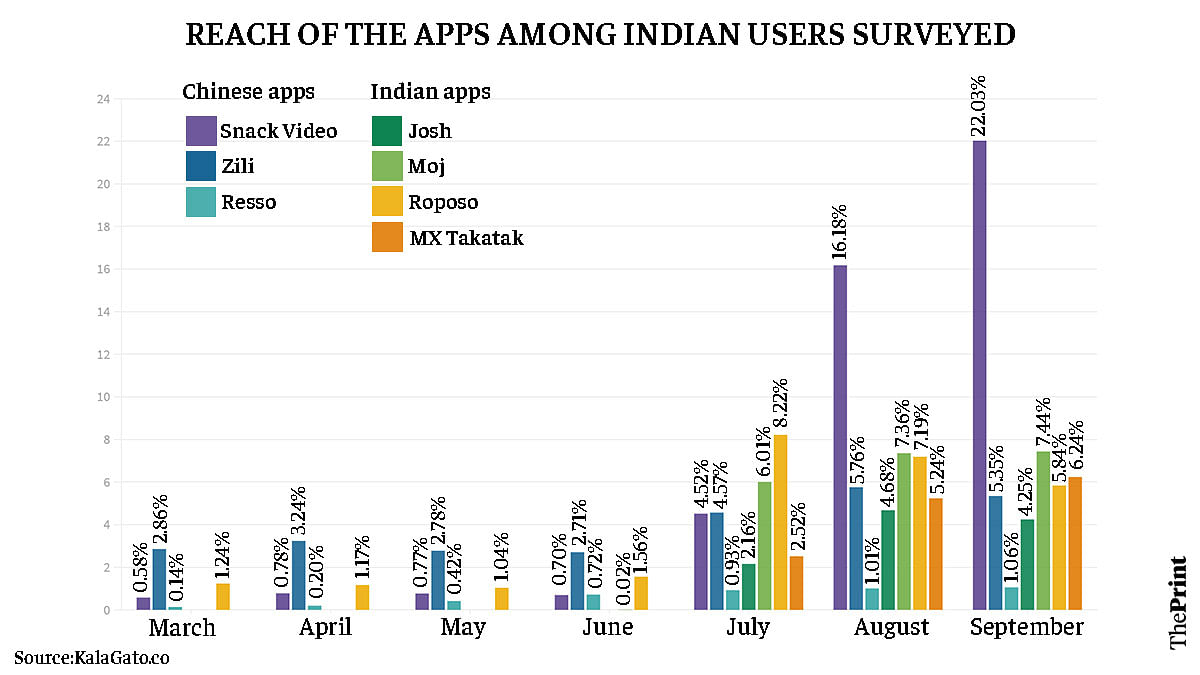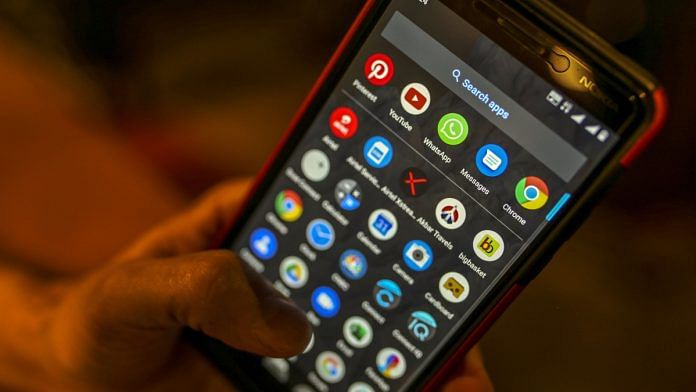New Delhi: The Narendra Modi government may have barred over 200 Chinese apps but some China-owned platforms that escaped this ban are growing in popularity, even more than Indian alternatives to TikTok.
The government had first banned 59 Chinese apps on 29 June after clashes between India and China in Ladakh led to a growing clamour to boycott Chinese products in the country. In July, the government had extended the ban to include 47 alternative versions of the 59 banned apps.
As tensions escalated with China again, the Modi government ordered another ban of 118 Chinese apps in September.
Some of the Chinese apps which escaped these bans are Snack Video by Kuaishou Technology, Zili by Xiaomi, and ByteDance’s Resso.
Among these, Snack Video, a short video app, has been the most popular. According to Delhi-based business intelligence provider KalaGato.co, Snack Video was present on 22.03 per cent of the 5.5 million unique smartphones in India that were sampled in September. In comparison, its nearest Indian competitor, Moj, was downloaded only on 7.44 per cent smartphones that month.
In an estimated internet using population of 450 million in India, this means Snack Video was likely used by 99,135,000 users.
In May, a month before the first ban was imposed, Snack Video was present only on 0.77 per cent user smartphones, which would be 3,465,000 users only.
Even on 1 November, Snack Video was the number one ranked app among free applications on Google Play Store.
In October, the Centre for Digital Economy Policy Research, a think tank, had written to the home ministry and IT ministry, seeking a ban on Snack Video too.
Also read: India should remove Chinese firms Huawei, ZTE from 5G & other ICT networks, US official says
Rise in Zili and Resso’s popularity
Two other Chinese apps that have grown in popularity are Zili and Resso. In September, Zili, also a short video app, was present on 5.35 per cent of smartphones surveyed, which would be 24, 075, 000 users. On 1 November, Zili was ranked number two on Google Play Store among free apps.
In comparison, downloads of Indian short video apps that were launched or began operating in the wake of TikTok’s ban were less.
Moj, developed by Indian social media platform ShareChat, was present on 7.44 per cent smartphones that were surveyed, which would be 33,480,000 users in September. The app was released on Google Play Store on 29 June, the same day that TikTok was banned by the government.
In September, MX Takatak, backed by India’s Times Internet and China’s Tencent, was on 6.24 per cent of the smartphones surveyed which would be 28,080,000 users. The app was launched in July.
Roposo, which is owned by Softbank-backed InMobi, was on 5.84 per cent of the smartphones surveyed which would be 26,280,000 users in September. It has been active since around 2014 but only started pivoting to a short video app around June 2019. A few days before TikTok was banned, Roposo was promoting itself as an app that takes content moderation seriously.
Dailyhunt’s Josh was seen on 4.25 per cent of smartphones surveyed which would be 19,125,000 users in September. The app was formally launched in September but it was released on Google Play Store on 4 July.
The figures of Resso, a Chinese music streaming app, have not been as high as Snack Video or Zili but it has seen a steady growth since March. In September, Resso was on 1.06 per cent of the smartphones surveyed which would be 4, 770, 000 users.
In March, Resso was only on 0.14 per cent of the smartphones surveyed. It was the number 1 app in the ‘trending’ app category on Google Play Store on 1 November.
Resso also has a higher open rate than other Chinese and Indian apps listed here. In September, Resso’s open rate was 9.23, according to KalaGato. Open rate is the number of times an average user opens an app in a 24-hour period.
In comparison, Snack Video’s open rate was 7.5 and the highest open rate among the above mentioned Indian apps was of MX Takatak (4.14) in September.

Also read: Bengaluru start-up makes AI news bulletin, but promises media jobs are safe. For now
Chinese-owned platforms
According to one report, Snack Video was registered by Kuaishou Technology in April. But it has been present on Google Play Store since February. Another app by Beijing-based Kuaishou Technology called Kwai was banned in India on 29 June.
Zili, developed by Xiaomi, has been on Google Play Store since November 2018 and Resso, owned by ByteDance, was launched in India in March but it has been on Google Play Store since May 2019.
ByteDance’s other apps such as TikTok, Helo, and Vigo Video were banned in India on 29 June.
ThePrint had on 28 October emailed these social media platforms to confirm their ownership by China-based firms. This copy will be updated if a response is received.
Also read: Why Indian app developers are most vocal in resisting Google’s 30% ‘gatekeeper’s fee’




Give us some time yaar definitely we can come out with the better product. Who knows these bans will happen suddenly no lead time. Stop this typical attitude of neighbour’s prepared dishes are tastier than ours Attitude.
What kind of message you want to spread so this is the best journalism & you expect us to pay for it. Poor Shekhar Ji, it reminds me ‘Alibaba Bechara bakhi Chalis Chor’ a title song of a famous Hindi TV serial of earlier days. Please do not take the meaning literally as Chors.
Except for the main framework, most of the software is developed by the Indian software engineers man. Give some time to improvise.
Thanks